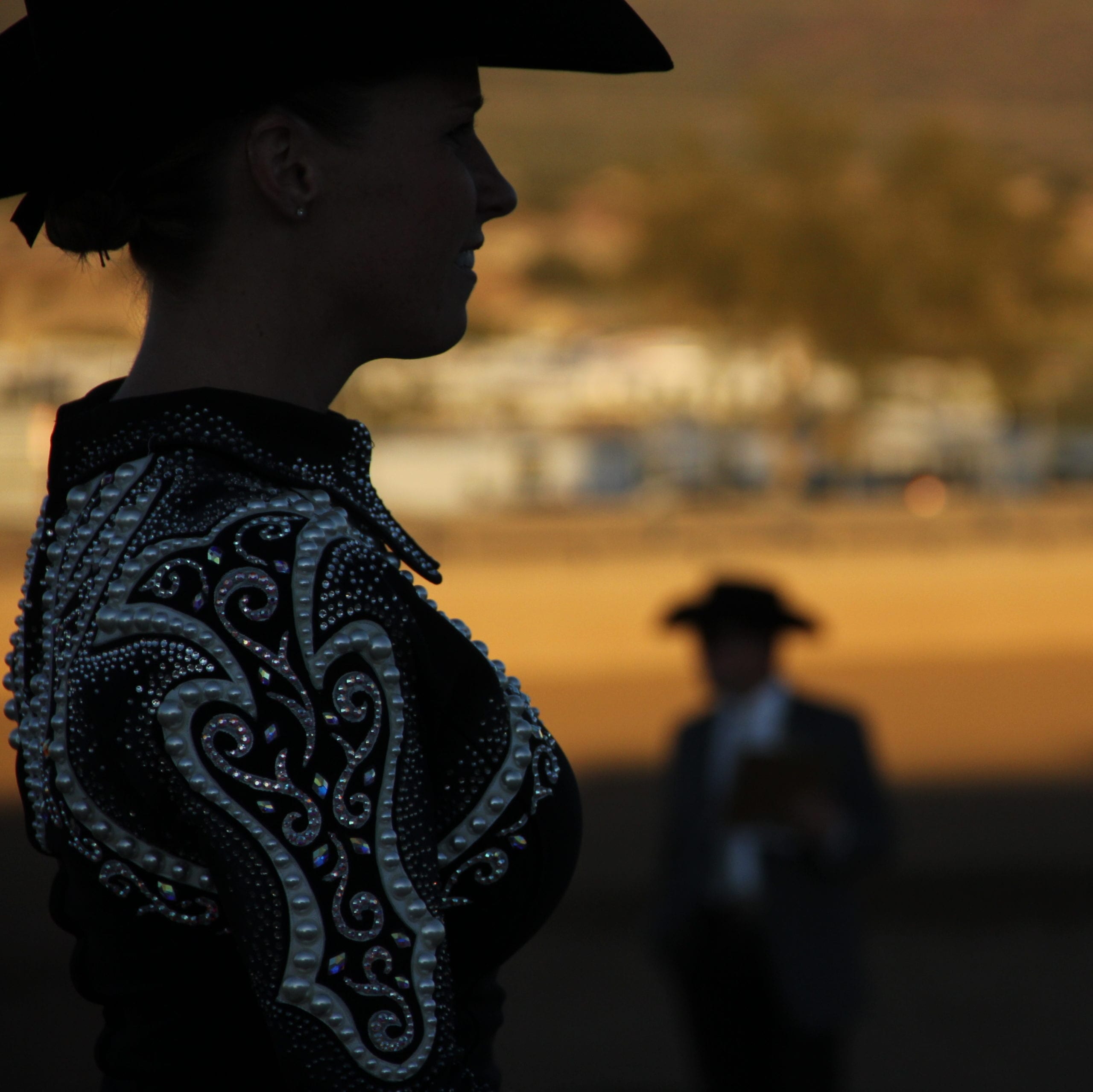If you have never won a World Championship, a Congress Championship or a major event, it is hard to feel sympathy for someone who has and now laments over the added pressure to repeat the performance. Winning at a young age has many benefits, but it can also bring baggage for the lucky young winners.
Some riders who win big early in their career either as a novice or as a youngster keep up the pace seemingly winning one major venue after another with relative ease. On the other hand, other competitors who win major events early on never do so again and are often left feeling frustrated or disappointed.
So why do some early bloomers fade while others continue to blossom? There are many answers to the question and all require a hard look at the personalities of both the rider and others involved in guiding the rider. For most riders the answer lies in how the rider handles the pressure competition inevitably brings about.
Everyone experiences pressure differently and how a person processes pressure is unique to that individual. This is especially difficult for some parents and coaches to understand. Children may become a casualty of their parents’ desire for them to succeed by feeling as though the parents’ love is dependent upon the child’s ability to win.
Coaches may be especially tough with their riders, rant and rave or treat each rider with the same tactics not realizing that some riders cannot function with their approach. Great coaches understand that each rider is unique in not only their ability on the back of a horse but also in the way they learn and perform under pressure. The best coaches help individuals of different personalities focus during high-tension situations revolving around competition.
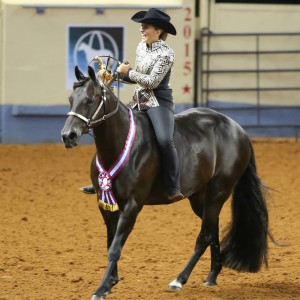 Youth Sydney Schneckel praises her coach, Bruce Walquist and her parents for keeping the competition in perspective. Her first big win came in the 11 & Under and Novice Youth 13 & Under Showmanship at the Congress. Most recently, she won the 2015 AQHYA World Champion Showmanship title.
Youth Sydney Schneckel praises her coach, Bruce Walquist and her parents for keeping the competition in perspective. Her first big win came in the 11 & Under and Novice Youth 13 & Under Showmanship at the Congress. Most recently, she won the 2015 AQHYA World Champion Showmanship title.
Sydney’s parents have, “always reassured me that it’s not a life or death situation if I win or lose. As competitors we all want to have our day in the sun and get too carried away with winning. At the end of the day, whether it’s a good or a bad one, I will always love my horse, my parents and what they both do for me,” Sydney related.
Early success like Sydney’s is seen by most to be an advantage, yet, it can result in putting additional stress on the young winner pulling at riders in various ways:
1) A big win sets a precedent. The desire to live up to expectations – of oneself, of parents or coaches – may overwhelm the rider’s ability to cope during competition and lead to the rider choking in the show pen. Fear of failure can settle in deep in the rider’s psyche – even without their knowing of its existence.
Amateur Whitney Walquist-Vicars remembers feeling pressure to win after winning her first World Championship in Horsemanship in 2007.
“We went to a show the very next week. When I stepped into the pen to do my horsemanship pattern at that show, I felt very nervous and I remember thinking I had just won the World last week,” Vicars recalls. “If I couldn’t win that day too, then, what kind of champion was I or how good was I really? I put more negative pressure on myself to win again that day then I ever had in the past. As time went on, I realized we are all humans and we can’t realistically win every single time.”
2) Riders may feel the need to defend their title and begin riding not to lose rather than riding to win. They may ride conservatively to avoid making mistakes and literally abandon the very exercises and methods they used to create their winning ride in the first place. Riding with a defensive frame of mind is not conducive to a fluid performance.
If this is you, remember, you have already won the title. No one can take that away from you – ever – you have nothing to lose. You do, however, have another title to gain. The title is yours forever. Go for it – ride with the same exuberance, excitement and enthusiasm as you did before you earned the title. This drastic shift in thinking makes a significant difference in your preparation and thus your performance in the show pen.
3) Success can lead to complacency. After a big win, a rider may feel they are good enough and may not think they have to practice as hard as they did prior to winning a major event. In the mean time, others, those who came in second or did not make the finals, go home, work harder than they had before and develop the skills to beat last year’s winners. It is a competitive world we live in and there will always be someone trying to figure out how to earn the title you seek. Continue to work as hard as you did before you earned the title. Growing in your craft is the only method to ensure success continues.
Whitney does not believe you ever arrive. Her father, trainer Bruce Walquist, “is very supportive of me but never allows me to get complacent with my riding. I’ve ridden with him for 23 years now, and he is still always teaching me something new and finding something else to work on,” Whitney remarked.
4) Internal pressure to repeat a win can put undue stress on the individual. For some, especially those whose internal drive to succeed is set too high or those with pushy parents or coaches, they cannot practice enough and eventually may suffer from burnout. Excessive training can take the fun out of riding undermining the students’ desire to learn and achieve. It is easy to place too much emphasis on short-term wins at the cost of long-term engagement and life long successes.
Nicole Barnes won the Congress and her first World Championship as a youth and today continues her winning way as an amateur. Yet, even with big wins under her belt, Nicole does not see herself as someone who succeeded early. But for those looking at her success from the outside, it is easy to think that winning started early for Nicole.
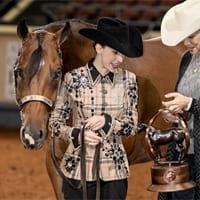 “I started showing horses when I was eight years old and showed at the AQHA Youth World Show five times in multiple classes before making the finals. My last year in youth, after winning the High Point Youth in 2004 and winning the Congress in 2004, I won the Showmanship at the Youth World in 2005, my last year as a youth exhibitor.”
“I started showing horses when I was eight years old and showed at the AQHA Youth World Show five times in multiple classes before making the finals. My last year in youth, after winning the High Point Youth in 2004 and winning the Congress in 2004, I won the Showmanship at the Youth World in 2005, my last year as a youth exhibitor.”
But success for Nicole has always been defined by the performance; the prizes are a bonus for good work. She indicated, “In our camp, you put in the work and time, and it either comes together as a great performance or it does not. At the end of the day, it is not about the prizes – it is about the performance.
Good performances, however, do lead to success in the show pen. Sydney agrees, “Before I go show I always make sure there’s no doubts about my pattern. Knowing that I’m ready to make a good run gives me the confidence to go make one.” Sydney finds the pressure adds seriousness to her routine and keeps her focused and disciplined. But that is not the case for all.
The rider who feels overwhelmed by pressure to repeat a particular win has much to overcome and will need support to regain the mindset they need to win. Changing the focus from winning to putting in their best performance is easier said than done. Riders in this situation must alter their thinking. They have lost confidence at a core level and their mental preparation must return to the state of composure that won the title in the first place.
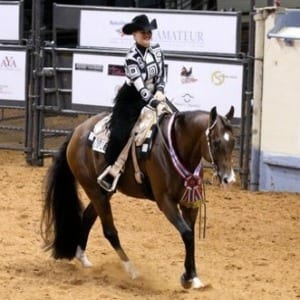 For Whitney that meant sticking, “to what I knew – practicing and preparing the same way I had at the Youth World. I had never won the Congress, and I wanted it just as bad as I did the World Championship. I paid close attention to every detail of my performance and treated it like any other important show. I knew that just because I had won before was no guarantee I would win again. There was tough competition and I had to be at my best to win. It was a completely different day with a different pattern and different judges. I also prepared with prayer as I always do before I show.”
For Whitney that meant sticking, “to what I knew – practicing and preparing the same way I had at the Youth World. I had never won the Congress, and I wanted it just as bad as I did the World Championship. I paid close attention to every detail of my performance and treated it like any other important show. I knew that just because I had won before was no guarantee I would win again. There was tough competition and I had to be at my best to win. It was a completely different day with a different pattern and different judges. I also prepared with prayer as I always do before I show.”
Learning to channel the energy and nerves in a positive manner takes a team and a great leader. “The support system I have in place in my family, trainer, fellow barn mates and the very talented horses I’ve had along the way have helped to keep the pressure to a minimum,” Barnes stated. “I don’t find that I have exterior pressure but rather that I pressure myself to maintain a high level of quality in my rides. I know that much of showing horses comes from mental toughness, and I work extremely hard to avoid pressure by staying mentally strong from start to finish. My goals are much more personal that just winning a particular class.”
Riders must have confidence on every level. In order to gain that confidence, they must be able to trust and depend on other team members to steer them in the right direction. According to Rosabeth Moss Kanter, a Harvard Business professor, confidence is built in layers, each building on the previous. She discussed four levels of confidence – as they pertain to horses they are:
1) Self-confidence. This is a personal attitude, a feeling of high self-esteem, the “I can do this” feeling and a sense of personal value – the thing that is absent when a competitor feels excessive pressure to repeat a win. Confidence produces great performances. It creates the will to persevere, to work hard, to make an error and look forward to getting back on the horse. Confident riders understand the performance is not the same as the performer – they do not define their self-worth by individual achievements.
2) Team-confidence. Regardless of the situation, no one rides alone. Everyone has someone around him or her who is considered a part of the team: a parent, a trainer, a coach or a friend. To put in great performances time after time, riders must be able to trust their team members to give and receive support, respect and good advice.
For riders with overly aggressive family they need an outside voice of authority to dissuade the pushy family member and to keep their detrimental remarks at bay. It is often out of love that someone says the exact wrong words for the rider. A good professional will prevent those words from negatively affecting the rider’s performance.
3) System-Confidence. This is the horse show world we live in. Riders must have confidence that the judges are educated; the system is not slanted to benefit one over another and there is accountability within the organization – judges, stewards and exhibitors all being held to the same standard.
4) External-Confidence. This would be the village including those who offer financial support like parents or spouses, leaders of our Associations, show management, veterinarians, farriers and all those people and organizations that make the horse show world exist. They do not depend on you to win – they depend on your desire to win – that mindset that keeps you trying that keeps you coming back time and again.
Winning takes a team; it takes showing with confidence and it takes trusting your team to support you. Whether standing on a stage or showing a horse, the most successful competitors feel energized before competition. Everyone feels anxious and excited, but those who gain focus from the stress of competition end up with the best performances.
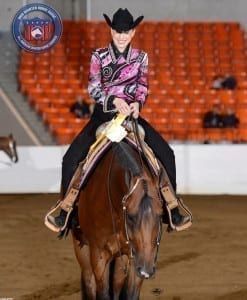 Winning leaves riders feeling more confident but it also can leave some feeling tremendous pressure – pressure that can lead to the destruction of the mindset that brought them to the winners’ circle. Every winner will eventually lose. How you handle the losses and setbacks determines how quickly you return to the winner’s circle. Like Whitney, Nicole Barnes believe you, “are always becoming a great rider.”
Winning leaves riders feeling more confident but it also can leave some feeling tremendous pressure – pressure that can lead to the destruction of the mindset that brought them to the winners’ circle. Every winner will eventually lose. How you handle the losses and setbacks determines how quickly you return to the winner’s circle. Like Whitney, Nicole Barnes believe you, “are always becoming a great rider.”
The most successful showmen understand they have ultimate responsibility for choosing their destiny and they choose to succeed accepting all the struggles that come with that choice. This assumes a certain level of maturity that some riders are simply too young to possess.
Overbearing parents often harm a child’s ability to repeat winning performances by putting too much pressure on the child to win. Children especially still need to have fun. But winners across the board in any field enjoy a sense of childlike fun when they perform. They are confident without being arrogant yet humble.
To maintain continued success, competitors must continue to grow. For Nicole Barnes changing her goals made it easy to find new areas to grow and develop.
“After we had to put Zippos Ace Of Spades down in 2010, I wanted to prove that I could be successful on another horse. Every horse since ‘Ace’ has been an opportunity for me to teach another horse and create another great performance,” Nicole indicated. “Now I enjoy taking young horses and making them into all-around horses for someone else to enjoy.”
Whitney had some strong final words of advice, “While work, drills, a good trainer, watching, good horses, and a great support system are imperative for continued success, ultimately I believe my Faith is what has taken me the farthest. My faith in God is the only way I can truly manage the pressure to stay competitive. I think remembering to keep it all in prospective and cherish the journey with your horse and the relationships you make along the way helps combat the pressure too. Strive for the win but don’t lose sight of the blessings along the way.”
Words to live by.


